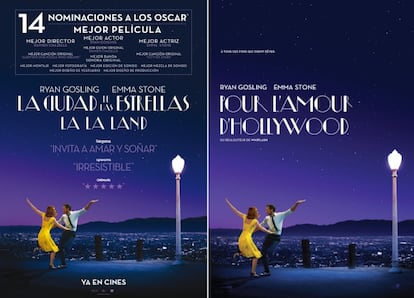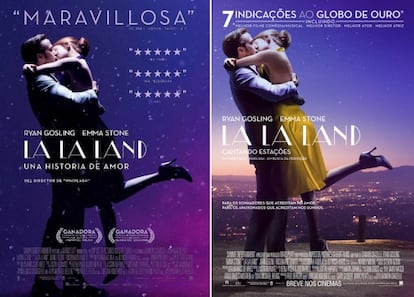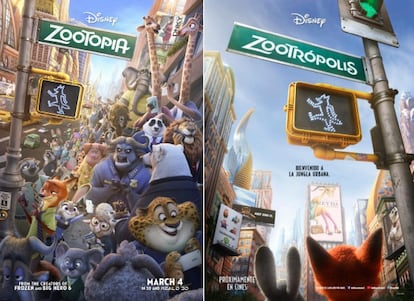Why do movie titles in Spain end up with such strange translations?
Changing the names of films such as ‘La La Land’ is sometimes necessary
Two Hollywood films, La La Land and Zootopia, have just landed in Spanish cinemas with rather puzzling name changes. Although the average Spanish movie goer is probably able to pronounce and remember the original titles, in Spain the pair have been rendered as La ciudad de las estrellas (or The city of stars) and Zootrópolis respectively. The renaming may seem superfluous, but some experts say they are necessary.

In the musical La La Land, Ryan Gosling and Emma Stone fall in love while dreaming of making it big in Los Angeles. The title is a play-on-words that even an advanced student of English might miss. To be in “La La Land” means to be detached from reality, a state in which the film’s protagonists often find themselves, especially during the musical numbers. At the same time, ‘La La’ is a reduplication of Los Angeles’ initials – L.A. – which is often how people refer to the city that is home to Hollywood. The title even works on a third front: ‘La’ is the typical sound that Anglophones give to music notes, which stresses the fact that this movie is a musical, while in Spain ‘La’ is not necessarily the sound of choice for singing music scales or forgotten lyrics.
A haunting song entitled City of Stars, composed by Justin Hurwitz, is used throughout the film. The song’s title is another nod to Los Angeles, yet more comprehensible to the Spanish audience than La La Land. This explains the marketers’ decision to call the movie La ciudad de las estrellas (The City of Stars) in Spain.
Hollywood knows the US film industry is increasingly important outside the country’s borders. In recent years, around 70% of revenue has come from foreign countries, according to the Motion Picture Association of America (MPAA).

Spain was not the only country that had to adapt the title of Damien Chazelle’s Oscar-nominated musical. In Brazil, it’s called La La Land: Cantando Estações (or, La La Land: Singing Seasons); in countries such as Mexico, Argentina and Peru it is La La Land: Una historia de amor (La La Land: A love story); in Portugal it is La La Land: Melodia de Amor (La La Land: Melody of Love); and for the francophone audience in Canada, it has been distributed as Pour l’amour d’Hollywood (For the love of Hollywood).
La La Land was made by Universal Pictures, a multinational company that has a presence in nearly all the world’s markets. For every movie they release, there is a global strategy. At Universal Pictures, translating movie titles “makes up part of our everyday work,” said a spokesperson from the company’s Spanish division.
The movie has been a box-office hit, earning more than $225 million worldwide, and becoming one of the most successful musicals of all time. In Spain, it made €5 million in the first few days of release.
Another case of an extended title is that of Ghost in the Shell: El alma de la máquina (or, Ghost in the Shell: The soul of the machine), which will hit Spanish cinemas on March 31. Besides including the original English title, an explanatory clause appears after the colon in Spanish. That is the work of marketers trying to give non-English-speaking Spaniards information about the film’s plot just by reading the title.

Legal problems
Zootopia, a recent Disney release, is a different case. The animated film about crime-solving animals had to be given a new title to avoid copyright problems in Europe. A Danish zoo had previously trademarked the name “Zootopia” throughout Europe, which is why Spain, the United Kingdom and Ireland call the movie Zootropolis and Germany calls it Zoomania.
Disney had a similar problem with Moana in the United States. In Spain, because of a perfume brand with the same moniker, the princess Moana was rechristened with the name Vaiana.
Even Spanish Oscar-winner Pedro Almodóvar had to re-think the name of his latest movie, Julieta. His first choice was Silencio (Silence) but when he realized that a Martin Scorsese film would be in cinemas at the same time, with the same name, he thought the best option was to call the film after its protagonist.

“Unfortunate ideas”
When a film is not distributed by a multinational, the translated title is usually decided by the producer and sales agent. “The process can be complex and some unfortunate ideas can emerge,” Simón de Santiago, producer with Mod Producciones, told Verne in September.
Santiago’s film Cuerpo de élite (Elite Corps) has done well at the box office in Spain this winter and is now looking for some international success. To avoid confusion, the production company proposed a generic name in English: Heroes Wanted.
“It’s just a suggestion; distributors in other countries don’t have to accept it,” he explained.

“Often, they don’t demand a finalized title if there are alternative proposals from other countries,” Álvaro Agustín, general director of Telecinco Cinema, told Verne.
Telecinco Cinema was responsible for financing and selling comedies by Spanish director Paco León abroad. One example is Carmina o revienta, which is reference to a Spanish film from the 1980s and has been translated into English as Carmina or blow up. Here, the allusion is undeniably Lost in Translation – a Sofia Coppola film, which, by the way, is translated in Latin America as Perdidos en Tokio (Lost in Tokyo.
English version by Alyssa McMurtry.
Tu suscripción se está usando en otro dispositivo
¿Quieres añadir otro usuario a tu suscripción?
Si continúas leyendo en este dispositivo, no se podrá leer en el otro.
FlechaTu suscripción se está usando en otro dispositivo y solo puedes acceder a EL PAÍS desde un dispositivo a la vez.
Si quieres compartir tu cuenta, cambia tu suscripción a la modalidad Premium, así podrás añadir otro usuario. Cada uno accederá con su propia cuenta de email, lo que os permitirá personalizar vuestra experiencia en EL PAÍS.
¿Tienes una suscripción de empresa? Accede aquí para contratar más cuentas.
En el caso de no saber quién está usando tu cuenta, te recomendamos cambiar tu contraseña aquí.
Si decides continuar compartiendo tu cuenta, este mensaje se mostrará en tu dispositivo y en el de la otra persona que está usando tu cuenta de forma indefinida, afectando a tu experiencia de lectura. Puedes consultar aquí los términos y condiciones de la suscripción digital.









































